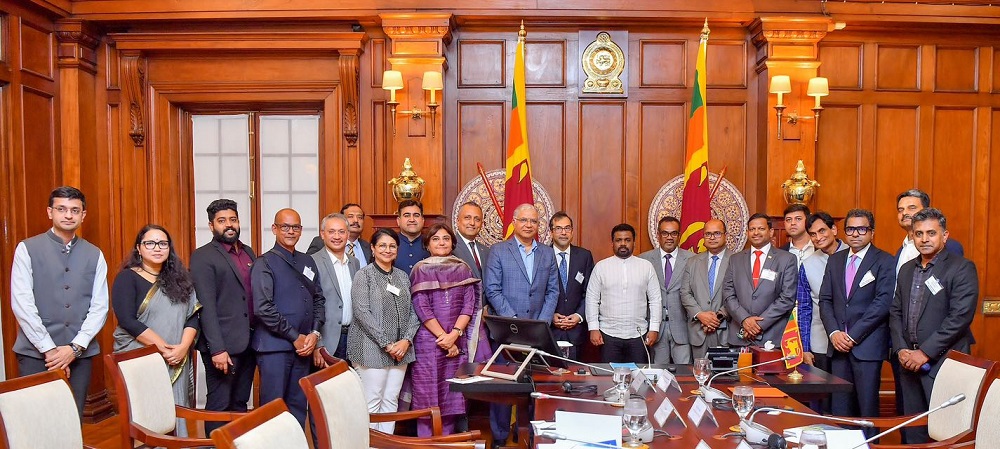Anura Kumara Dissanayake pledges clean investment environment during high-level talks with Indian business leaders

(Lanka-e-News -02.July.2025, 11.20 PM) Sri Lankan President Anura Kumara Dissanayake has declared an end to the “bitter experiences” previously encountered by foreign investors in Sri Lanka—particularly allegations of bribery and corruption that marred previous regimes. The President made this assertion during a high-level dialogue held on July 1 with senior executives from several prominent Indian conglomerates who are currently visiting the island in search of new investment opportunities.
The discussion, which took place at the Presidential Secretariat in Colombo, formed part of a broader investment promotion initiative coordinated by the Confederation of Indian Industry (CII) and follows a formal invitation extended by President Dissanayake during his recent official visit to India.
Addressing the visiting delegation, President Dissanayake said that the era in which investors were subjected to opaque practices, backdoor dealings, and extortion under the guise of bureaucracy is over.
“Sri Lanka has now laid the foundations for a more transparent, rule-based, and corruption-free investment environment,” he said. “The unpleasant experiences of the past will not be repeated.”
The President highlighted the steps taken by his administration to strengthen legal and institutional frameworks, which now offer long-term investors the confidence and protection needed to operate in Sri Lanka. He said the government had “learned the hard lessons” from the island's recent economic collapse and is committed to avoiding the governance failures that led to mismanagement and investor distrust.
The visiting Indian delegation, consisting of around 20 C-suite executives and chaired by former CII President and ITC Limited Chairman Sanjiv Puri, expressed keen interest in a range of sectors, including:
Renewable and conventional energy
Transport and infrastructure
Digital economy and fintech
Tourism and hospitality
Agri-tech and sustainable agriculture
Capacity-building for entrepreneurship
The delegation acknowledged Sri Lanka’s strategic geographic location, stable currency, and improving macroeconomic indicators as critical advantages for future investment.
Several Indian representatives noted that while there had been hesitation in the past due to reports of bureaucratic red tape and alleged demands for informal payments, the current administration’s proactive stance had rekindled optimism.
“The clarity provided by the President today has encouraged us,” said one Indian industrialist. “There is a renewed sense of trust in the system.”
The delegation is part of a CII-led initiative aimed at deepening India-Sri Lanka economic ties through structured engagements with both government and private stakeholders. Since arriving in Colombo, the group has met with several Sri Lankan Cabinet ministers and officials from the Board of Investment of Sri Lanka (BOI), with whom they discussed current incentives and the country’s renewed commitment to investor protection.
President Dissanayake’s assurances come as Sri Lanka enters a crucial phase in its post-crisis recovery. Following an IMF-backed stabilisation programme and a gradual easing of inflationary pressures, the country is now looking to attract large-scale FDI to reboot growth.
The President underlined that legal reforms introduced under his administration had created a predictable regulatory climate with enhanced dispute resolution mechanisms, updated commercial law, and strong enforcement against financial malpractice.
The President emphasised Sri Lanka’s desire to position itself as a regional investment hub, particularly for Indian and South Asian enterprises looking to expand into the Indian Ocean and ASEAN markets.
“We are paying particular attention to regional investors and are committed to removing logistical and regulatory barriers that may have previously hindered entry,” he said.
In addition, Sri Lanka is exploring public-private partnerships (PPPs) in logistics, renewable energy parks, port expansion, and export processing zones—all areas in which Indian firms could potentially play a key role.
Economic analysts view this visit as part of a broader recalibration of Indo-Lankan economic relations. With China’s footprint in Sri Lanka under increased scrutiny and the Malima government pursuing a more balanced and non-aligned investment strategy, Indian companies are sensing an opportunity to consolidate their presence.
This pivot is particularly important in sectors where India has historically had competitive advantages—such as pharmaceuticals, information technology, agricultural inputs, and clean energy.
Meanwhile, the President made a point of emphasising Sri Lanka’s neutrality and openness to all investment partners, stating that transparency and good governance, not geopolitics, will guide investment policy going forward.
Echoing the President’s remarks, Deputy Minister of Economic Development Prof. Anil Jayantha Fernando and Chief Presidential Advisor Roshan Gamage also highlighted the government’s vision for a “new investment culture” in Sri Lanka—one where businesses operate in an ecosystem that supports entrepreneurship, integrity, and innovation.
Officials from the Indian High Commission in Colombo, including High Commissioner Santosh Jha, joined the meeting and underscored India’s continuing commitment to Sri Lanka’s economic development.
The business community in Colombo responded positively to the high-level dialogue, with several local chambers noting a perceptible uptick in investor sentiment and interest in joint ventures.
“What we’re witnessing is a gradual restoration of trust, which is essential for long-term investment,” said a senior BOI official. “This engagement with Indian industry could serve as a model for similar bilateral missions.”
Sanjiv Puri, the ITC chairman, reportedly described the talks as “productive and encouraging,” noting that Sri Lanka’s new governance trajectory makes it a “compelling destination for responsible capital.”
President Dissanayake’s message was clear: while Sri Lanka cannot rewrite the past, it is determined to shape the future. By confronting its legacy of corruption and aligning its policies with international standards of transparency and rule of law, the government hopes to convert investor goodwill into real capital flows.
The coming months will test whether these commitments translate into sustained FDI inflows and economic resilience. For now, however, the symbolic value of this week’s dialogue is unmistakable—Sri Lanka is open for business, and this time, the door is not greased with bribes.
-By LeN South Asia Economic Correspondent
---------------------------
by (2025-07-02 21:43:21)
Leave a Reply